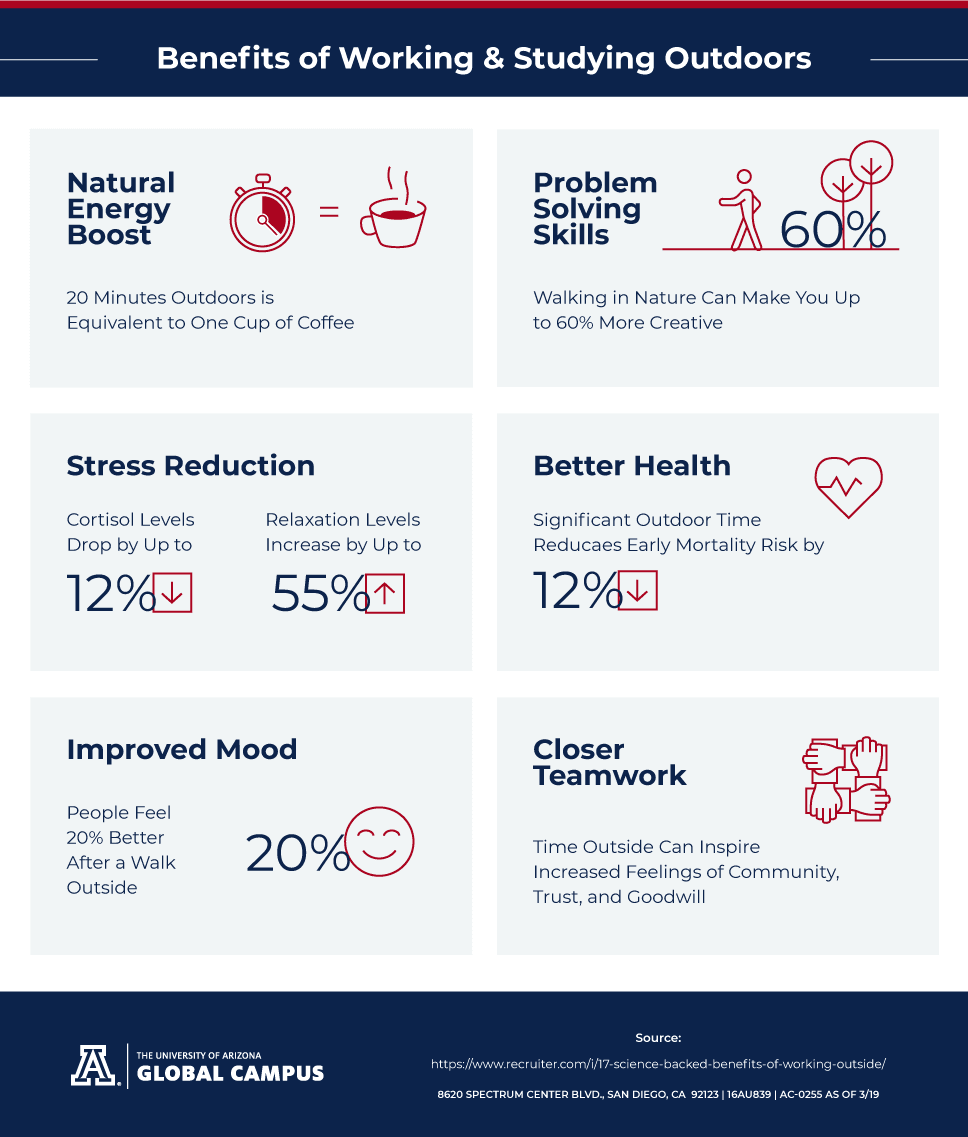In the age of mobile technology, we have more power and flexibility to choose our own settings for work and study. We can spend our productive time alone, with peers, at home, in an office, or even in a park or at the beach.
When taking stock of study options, it's important to be realistic, weigh the pros and cons, and choose the study environment that best suits the situation.
Would you prefer to study indoors or outdoors? Which is more appropriate for the work at hand? Which emphasizes your own best study habits? Do you know how to study outside in such a way that you get more accomplished? Some academic and professional work is still best performed inside, but if you’ve never worked or studied outside, it may be worth considering.
The Benefits of Working Outside
As a child in a classroom, you probably spent more time than you'd care to admit staring longingly out the window, watching birds and insects fly by, and wishing you could join them in the fresh air and sunshine.
You may have had the right idea. Most of us could benefit from spending more time outdoors. Aside from the exercise, oxygen, and vitamin D, time outside can improve calmness and mental clarity, promote relaxation and emotional exuberance, and get us in stronger harmony with nature.
Some of the many known benefits of working and studying outdoors include:
- Increased natural energy
- Boosted problem-solving skills
- Better health
- Reduced stress
- Improved mood
- Better teamwork
The Great Outdoors: Great for Students, Too
At schools such as the University of Arizona Global Campus, trends in the workplace, along with a larger emphasis on personal enrichment, are reflected in how students prepare for their careers. Spending some time outside can be an appealing option for students, too.
Some teachers have also embraced the benefits of holding class sessions outside. Indeed, recent studies indicate that, when students take their learning materials outdoors, they can tackle their subjects with enhanced motivation, creativity, and competence, and may even strengthen their peer relationships in the process.
For careful study that requires creativity, pattern-matching, and putting ideas in a broader context, working outside may be just the spark of inspiration required for a breakthrough insight.
In the words of the author and naturalist John Muir, "When we try to pick out anything by itself, we find it hitched to everything else in the universe." In nature, it’s easy to observe how everything is connected. In academic pursuits, interdisciplinary thinking can help students put information in a broader context, giving them greater agency in the complex modern world. This sort of flexibility is what the University of Arizona Global Campus values and provides.

When It's Time to Consider Taking Your Work Inside
The world outside is full of distractions. The best indoor professional and educational environments are designed with productivity in mind, in a manner that outdoor settings can't always facilitate.
- Most meetings or group study sessions are better held inside, especially if they involve teleconferencing
- If your work or study activities require reliable access to the internet, consider keeping them inside
- If you’re optimizing for privacy, as a preference, or for security, you’re better off in a closed location
In most cases, studying or working outside may be better as a brief respite or reward than as a full-time proposition. Experiment with different settings and take objective stock of your results.
If you choose to study outside, it's important to remain mindful and recognize when you're losing focus, before it negatively affects your productivity. Here are a few signs you may be drifting:
- You're more engrossed in what's going around you - whether autumn leaves, butterflies, or people-watching - than you are in your own work
- Ambient noise impedes your concentration or communication
- You’re troubled by uncomfortable temperatures, weather conditions, or allergic reactions
If you lose track of what you’re doing, you can either go inside or take some steps to regain it:
- Recalibrate to improve your focus and flow
- Allocate your time so that you can perform the right tasks in the right environments
- Mix in physical challenges, such as riding a bike, to keep yourself engaged and stimulate your body and mind
How to Find a Career That Will Let You Work Outside
70% of employees now spend at least one day a week working remotely, with 53% off-site for at least half the week. This flexibility about choice of work environments is part of an increasing concern with employee retention, which has inspired some creative and unorthodox policies.
Some companies even have successfully implemented "work outdoors" policies, allowing or requiring their employees to spend some productive time closer to the wild. The apparel giant L.L. Bean and the coworking company Industrious are two notable examples. Kathryn Pratt, the director of brand engagement for L.L. Bean, distinguishes between encouraging outdoor work and, for example, allowing more vacation time. “We’re not viewing this as an escape,” she says. “The framework is productive time in the outdoors.”
With digital technology dominating the professional landscape and getting more mobile by the hour, more work will likely be performed outside traditional office settings. 55% of hiring managers anticipate a rise in remote work in the coming years. If you really love working outside, you don’t need to wait - you can choose a career that lets you spend more time outside.
Some outdoor-friendly fields include:
- Hospitality and Service Management: Consider becoming a lodging manager, outdoor guide, or wine professional.
- Journalism and research: Some writers explore the outdoors for a living.
- Environmental Studies: A career in biology and environmental sciences will keep you interlinked with the stuff of life.
In the modern world, you have more freedom than ever before to choose the career you want if you’re fully aware of your options. You just need the right education, information, and guidance. Contact a UAGC advisor today, and start creating your next great outdoor adventure.

